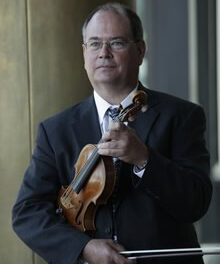Meymandi Concert Hall appeared to be totally full for North Carolina Opera‘s matinee performance of the Act I Prelude and Act II of Richard Wagner’s Tristan and Isolde. Perhaps there is a Wagnerite base in the Triangle and surrounding areas of North Carolina that would make at least an occasional production a worthwhile endeavor. I define a Wagnerite as a person who upon having just heard a four and a half hour Wagnerian opera is sad because it is now over… and who has a haunting urge to go back to the beginning to listen to it all over again, though this is usually impractical and often impossible.
For many it was like the other shoe dropping, or hearing the cadence of “Shave and a hair-cut…,” after a long pause. Since January 27, 2013, when Jay Hunter Morris had to cancel his scheduled appearance in Act I of Die Walküre due to illness, many fans in the surrounding area have eagerly awaited this event. Well, today we got Morris and much, much more.
First, a few words about Wagner’s Tristan und Isolde – the libretto, which like all of Wagner’s operas was written by the composer himself, and the music, which is a work of unmitigated genius. It is the single most influential work of art in history. The famous “Tristan chord” which we hear at the beginning of the Prelude opened the language of music for composers like Mahler and Richard Strauss and Sibelius and Elgar and hundreds of others. Even Debussy, who disliked Wagner’s music, was profoundly influenced by it. Writers like Proust and Joyce and T.S. Eliot, and techniques like stream-of-consciousness and the use of recovered memories, are direct offshoots of Tristan und Isolde. While Freud and Jung cannot be directly traced from Tristan‘s influence, none-the-less Wagner’s intensely psychological libretto and even more intense music portend the theories and thoughts of the psychoanalysts. Van Gogh and Kandinsky and numerous other painters found inspirations out of Tristan. Most of the movie music written up to the 1950s and much of it still today bears Wagner’s influence.
The point is that genius rubs off on genius, and when you have the work of a genius like Wagner, a cast of outstanding singers, an orchestra of first-class musicians, and a conductor who knows the work and understands the intricacies of bringing all this together; then something absolutely magical takes place, as it did on this lovely fall afternoon. This was, in my opinion, a great performance, one that was almost unbearable in ecstatic beauty in places.
Timothy Myers conducted the North Carolina Opera Orchestra in a stunning performance of the Prelude. From whisper to passionate climax and down the other side of the arc to the quiet denouement it was superbly shaped and nuanced.
It is Wagner’s practice in all of his operas to have the music tell the story, and the opening music to the second act is exemplary of this. The tension and excitement of the two lovers anticipating their meeting gets into your bones as you listen to the Act II Prelude. Throughout the performance, the orchestra was superb.
The singing was nothing short of magnificent. Morris as Tristan was a featured artist. His story is widely known – as an understudy he stepped into the gargantuan solo of Siegfried in the premiere of Robert LePage’s production of the Ring at the Met in 2011 and was a smash hit. His large tenor voice with its rich baritone qualities and his charming down-home personality have made him a hit wherever he appears. His cool stage presence lent humanity to his characterization. Add to this his extraordinary vocal skill and hearing him, especially in this role, was just awesome.
Heidi Melton returned to Raleigh after her highly successful performance in Dvořák’s Rusalka last season. Her voice is gorgeous, with a velvety quality and a full luminous range that was especially thrilling in the higher tessitura. She portrayed her character with eyes, facial expressions, and gestures, and she was captivating in the role of Isolde.
When Melton’s and Morris’ voices blended in the upper register during the “Night of Love” scene it was almost unbearably beautiful. And when Elizabeth Bishop, singing from the second level of box seats, came in with her “Beware” passage I thought surely I would die. This is otherworldly music that is an opera experience like no other. Bishop’s rendition of this glorious music was absolutely breathtaking.
Richard Wiegold sang the role of King Marke. Wagner’s music expresses sadness rather than the anger of the king over Tristan’s disloyalty. Wiegold’s powerful and rich bass provided a moving confrontation and a notable contrast with the rapturous singing we had just heard from the lovers.
Wade Henderson, arguably the finest operatic tenor in the Triangle, sang the role of Melot, Tristan’s erstwhile friend who betrayed the lovers. He was outstanding in this role.
This performance will be remembered for a long time to come. The only disappointment was the omission of the three-word role of Kurwenal. He is the first one to appear as King Marke’s hunting party interrupts the passion of the lovers. He cries out to Tristan, “Rette dich, Tristan!” (Save yourself, Tristan!) It is a significant lynchpin in the development of the drama and it was a shame to leave it out – not a disastrous flaw, but one that should be pointed out at least.
As I have made clear, this was an inspired performance. Bravo to Eric Mitchko, North Carolina Opera, the wonderful musical artists, and all involved.











